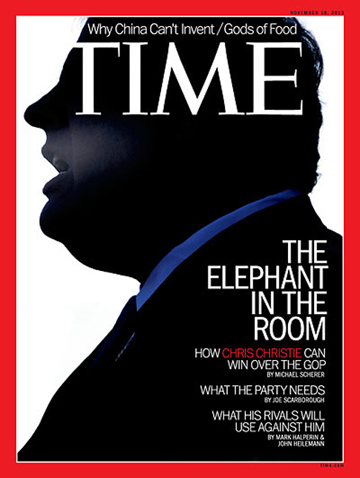
(2 of 4)
From Parsippany to Cape May, Christie's message, often devoid of policy or ideology, was designed and delivered for national consumption. He campaigned in Hispanic and black precincts he didn't need to win just to show that he could. His election-night party, with moneymen looking on from the balcony, was produced for a national audience with all the tricks of a presidential campaign. "If we can do this in Trenton, New Jersey," Christie thundered, "maybe the folks in Washington, D.C., should tune in their TVs right now, see how it's done."
Maybe at another time, that would all be enough. Lord knows the Republican Party needs a savior; fewer than 1 in 4 Americans see the brand positively. But the TVs that matter for Christie don't hang in Washington. They can be found in the farmhouses that dot the rolling hills west of Des Moines, Iowa, and in the commuter towns of southern New Hampshire. David Axelrod, the strategist who launched Obama onto the national stage, tweeted from the sidelines before Christie spoke, taunting the clear threat to his party's future. "Ever see a large man shot from a [cannon]?" he wrote. "But will he have a place to land in this GOP?"
A Feel for the Jugular
The Christie for America 2016 calculation goes like this: All Republican nomination contests usually go the same way. Primary voters claim to be big-C Conservatives, but they vote with a small c. After months of carping and griping, after rubber-chicken dinners, purity tests and endless debates, the party always settles on the most viable center-right option who has earned his place in line--Bob Dole, George W. Bush, John McCain, Mitt Romney. As Christie might say it, the party decides it wants to win.
Christie's strategy is clear enough, to execute a political coup de main: to try to clear the field (or his side of the field) by coming on very strong at the outset to take up the Establishment real estate. With four or five others (Cruz, Rand Paul, Rick Santorum and others) battling to become the purist on the right, Christie's initial goal is simply to be the Electable One. Yes, he may command only 15% of the total GOP electorate at the outset, but in a fractured field, that's fine with him. If he is lucky, he might win Iowa by a little, New Hampshire by a lot. If he can squeeze by, the big states will love the big guy.
To aid in the effort, Christie will have some significant financial--and logistical--advantages. Sitting governors are much better fundraisers than any other kind of politician. And in a few weeks, Christie is going to supercharge that claim when he takes over command of the Republican Governors Association, which is looking to protect 22 governors who are up for re-election in 2014, including, conveniently enough, the leaders of South Carolina, Florida and Iowa. He will soon be traveling the country, collecting cards and chits and IOUs, all at someone else's expense. "In the big cities where the GOP money will be raised," says Wayne Berman, a leading Republican fundraiser and consultant, "Christie is already the default choice."
